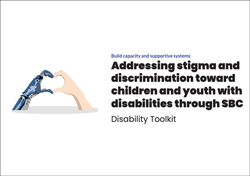Addressing stigma and discrimination toward children and youth with disabilities through SBC – Disability Toolkit
This toolkit was developed to help achieve a world where “all children, including those with disabilities, live in barrier-free and inclusive communities, where persons with disabilities are embraced and supported, across the life cycle, to realize and defend their rights, and to achieve full and effective participation” (UNICEF Disability Inclusion Policy and Strategy, 2022-2030).
SBC programming has a critically important and urgent role to play in identifying and implementing solutions that empower children with disabilities and their families and support their social inclusion. We are therefore pleased to share this practical guide to understanding and tackling the social norms and behaviors that limit the inclusion of children with disabilities in their communities.
This toolkit aims to provide insights, tools, and resources to help you understand the barriers to the inclusion of children with disabilities, with a focus on stigma and discrimination, and to offer practical support for designing, implementing, monitoring, and evaluating social and behavior change (SBC) interventions that include children with disabilities and their families and empower them to be included in their communities and enjoy the same opportunities as their peers.
This toolkit comprises an introduction, a foundational module, seven thematic modules, a user guide and a Theory of Change (PowerPoint presentation).
The modules are as follows:
Module 0: Foundation
Module 1: Inclusive evidence generation
Module 2: Empowering children and youth with disabilities and their families
Module 3: Understanding and engaging communities
Module 4: Building disability-inclusive services
Module 5: Strengthening partnerships for advocacy
Module 6: SBC for disability inclusion in humanitarian action
Module 7: Monitoring, Evaluating, and Measuring
Last modified: May 2, 2024
Language: English
Source: UNICEF
Year of Publication: 2024

